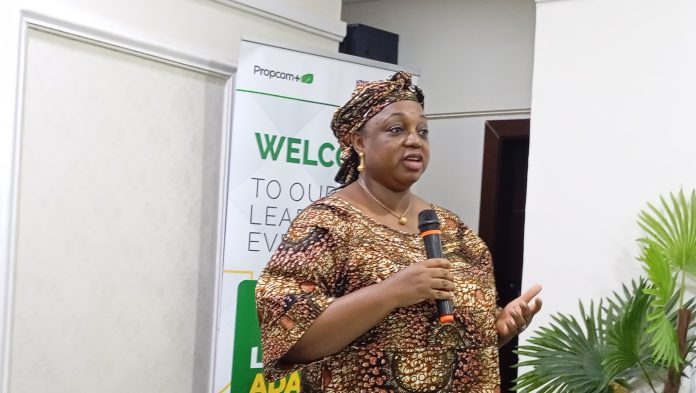United Kingdom-funded agricultural intervention, Propcom+, says it plans to transform Nigeria’s rural economy through climate-smart agriculture, targeting nearly four million smallholder farmers and Small and Medium Enterprises, SMEs, by 2030.
Country Representative and Political Director of Propcom+, Dr. Adiya Ode, disclosed this at a Media Training on Clinate-Smart Agriculture in Yola, Adamawa State, on Tuesday.
Ode explained that the £95 million programme, funded by the UK’s Foreign, Commonwealth and Development Office, FCDO, under its International Climate Finance, ICF, portfolio, is designed to build resilience among farmers while boosting productivity and incomes.
“By 2030, we aim to transform the lives of 3.79 million smallholder farmers and SMEs, ensuring at least half are women or women-led enterprises. Our goal is not just food security but also environmental protection, stronger livelihoods, and resilience in the face of climate change,” she said.
She noted that Propcom+ deliberately integrates climate change as a core priority, lamenting that persistent challenges such as land degradation, flooding, drought, low access to finance, and recurring farmer-herder conflicts, have continued to hamper agricultural productivity across Nigeria.
According to her, Propcom+ adopts a market-systems approach, working with private sector actors and government institutions to strengthen agricultural value chains without distorting existing markets.
“We facilitate market actors and create an enabling environment for sustainable agricultural practices. Our approach is about systemic change, not short-term fixes,” she added.
Ode said Propcom+ is currently active in several states, with Tier 1 focus in the North, including Jigawa, Kaduna, Kano, Adamawa, and Gombe, while also supporting agroforestry and sustainable commodities such as oil palm and cocoa in southern states like Edo, Cross River, Ekiti, Ondo, and Enugu.
She stressed the importance of media collaboration in reshaping public understanding of climate-smart agriculture, saying “the media are not just reporters; they are partners and agents of change. Your work helps Nigerians understand the urgency of adapting agriculture to climate realities.”
The eight-year programme, which officially commenced in 2023, seeks to increase farmer incomes, enhance food security, and mitigate environmental degradation while positioning agriculture as a driver of inclusive rural transformation.
Also speaking, the Director of Strategy at Propcom+, Dr. Olumide Ojo, stressed that the initiative deliberately operates as a market-systems programme, staying behind the scenes to enable local actors to lead.
“Our role is to facilitate, support, and enable, not to dominate the space. We don’t work directly with small-holder farmers; we support the seed companies, processors, and aggregators who link with them. That way, interventions are sustainable, and markets are not distorted by donor visibility,” he said.
Ojo outlined Propcom+’s three core pillars of the programme which include scaling proven agricultural models such as seed processing and distribution networks that already show commercial viability.
He added that others include testing innovative approaches that attract women and young people into agriculture while lowering carbon footprints; and influencing the enabling environment by working with policymakers to create laws and regulations that make climate-smart practices affordable and practical.
He said Propcom+ constantly conducts scenario planning and horizon scanning to anticipate market disruptions, whether from government policy shifts or climate events, and designs flexible interventions in response.
On his part, Propcom+ Technical Lead for Scaling Markets, Mr. Osigbodi Obajulu, disclosed that the programme is engaging in strategic partnerships with private veterinary pharmaceutical companies to expand access to livestock vaccines and improved seed varieties for smallholder farmers.
Obajulu lamented that last-mile farmers are usually excluded from functional markets and denied access to essential vaccination services.
According to him, Propcom+ bridges this gap by linking veterinary pharmaceutical companies with trained community animal health workers, CAHWs, and private para-professionals, PPPs, who provide door-to-door services.
He noted that this arrangement not only extends the business reach of vaccine producers but also ensures that rural farmers reduce livestock mortality and morbidity.
Obajulu added that the programme currently works with nine veterinary pharmaceutical companies implementing this model in Adamawa, Gombe, Bauchi, Jigawa, Kano, Kaduna, and several other states.
He stated that while stimulating demand for vaccines, Propcom+ is also strengthening supply by supporting the National Veterinary Research Institute, NVRI, to expand production of Newcastle Disease and PPR vaccines, which are critical for poultry and ruminant farmers.
The programme is further working with private importers to ease vaccine importation and encourage long-term private sector investment in the vaccine supply chain.
Obajulu further stated that beyond livestock health, Propcom+ is also addressing Nigeria’s chronic seed supply gap, adding that while the country requires about 300,000 metric tons of improved seeds annually, local production is only about 90,000 metric tons.
To close this gap, he said Propcom+ supports seed companies to scale production through a Community Seed Multiplication, CSM, model, where outgrowers are trained and equipped to produce certified seeds on their own farmlands.
He added that this model has significantly increased the availability of rice, maize, soybean, sorghum, and millet seeds across programme states.



